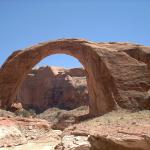This Week in People’s History, Aug. 14–20

A Rainbow Turned to Stone
115 YEARS AGO, on August 14, 1909, Nasja Begay and Jim Mike, two Paiute Indians with expert knowledge of the desert in southern Utah, led, on horseback, a small expedition of geologists and surveyors from the U.S. Bureau of Land Management. After several days’ travel through extremely rugged terrain, they came within sight of their objective, one of the world’s largest natural arches, known to the local Indigenous population as Nonnezoshe, or "rainbow turned to stone."
It was the first time any U.S. official had seen the extraordinary sight.
The sandstone arch, which had been created by the erosive force of wind and water, and had been a sacred site for centuries, was soon designated Rainbow Bridge National Monument. It is now a part of the Glen Canyon National Recreation Area. https://www.nps.gov/rabr/learn/historyculture/commingsdouglas.htm
Turn On, Tune In, Drop Out
55 YEARS AGO, on August 15, 1969, the 3-day Woodstock Music & Art Fair opened in Bethel, New York, 95 miles north of New York City. With more than 400,000 attendees who came to groove to Jimi Hendrix, Jefferson Airplane, The Who, Janis Joplin, Grateful Dead, Ravi Shankar, Arlo Guthrie, Country Joe McDonald and many more, it remains a pivotal moment in the history of popular music and in the consolidation of the countercultural revolution. https://www.history.com/topics/1960s/woodstock
A Great Assembly of the Fearless and Free
205 YEARS AGO, on August 16, 1819,some 60,000 working-class people gathered in St. Peter’s Field, a large open space in central Manchester, to cheer speakers demanding political and economic reform. It was said to have been the largest such gathering ever to have occurred in England.
Local officials responded with ruthless brutality. They declared the meeting to be an illegal assembly and called for the arrest of everyone on the speakers’ platform. Then they ordered 1500 troops and police to disperse the crowd. Some 700 cavalry charged in with slashing sabers. At least 17 unarmed and unresisting protesters were killed and some 700 wounded, many of them very seriously. The attack, which was almost certainly the 19th century’s bloodiest political event in England, was ironically labeled The Peterloo Massacre because of its resemblance to the Battle of Waterloo, which had taken place four years earlier.
The barbarity of the soldiers’ attack on the unthreatening crowd horrified almost everyone who learned about it, including England’s most famous living poet, Percy Bysshe Shelley, who quickly produced two poems on the subject, “England in 1819,” and “The Masque of Anarchy,’ subtitled “Written on the Occasion of the Massacre at Manchester.” The latter poem ends with what can only be described as a call to arms:
“Rise, like lions after slumber
In unvanquishable number!
Shake your chains to earth, like dew
Which in sleep had fallen on you:
Ye are many—they are few!”
https://www.marxist.com/the-peterloo-massacre-at-200-the-barbarism-of-british-capitalism.htm
‘A New Language of Music’
65 YEARS AGO, on August 17, 1959, Miles Davis’s album, “Kind of Blue,” with Davis on trumpet, saxophonists John Coltrane and Cannonball Adderley, pianists Bill Evans and Wynton Kelly, bassist Paul Chambers and drummer James Cobb was released by Columbia Records. “Kind of Blue” is widely considered to be a masterpiece, and very possibly Davis’s greatest work. As pianist Chick Corea said of the album later, "It's one thing to just play a tune, or play a program of music, but it's another thing to practically create a new language of music, which is what Kind of Blue did." https://youtu.be/pBpLKm8vw4M?si=hHQUzR-F_1-kqFfx
Whites’-Only Athletics Is a Big Loser
60 YEARS AGO, on August 18, 1964, the International Olympic Committee banned South Africa from participating in the Olympics. The ban, which remained in effect until 1992, was imposed because South Africa’s apartheid laws outlawed competition between white and Black athletes and only whites were allowed to represent South Africa in international competition.
The IOC’s decision came five years after an international movement demanding an end to apartheid had started, and the United Nations had begun to impose sanctions on South Africa in 1962. The IOC’s ban was only lifted after South Africa gave apartheid up, beginning in 1992. https://mail.jpanafrican.org/docs/vol5no3/5.3%20AfricanAmericans.pdf
Songs to Fan the Flames of Discontent
115 YEARS AGO, on August 19, 1909, the first edition of Songs of the Workers, on the Road, in the Jungles, and in the Shops—Songs to Fan the Flames of Discontent was published by the Industrial Workers of the World in Spokane, Washington. Widely known as The Little Red Songbook, the volume, which has gone through countless editions and revisions, has never gone out of print. It remains an indispensable pocket-sized compendium including “Up From Your Knees,” “The Commonwealth of Toil,” “Solidarity Forever,” “Workers of the World, Awaken!,” “There Is Power In A Union,” “The Tramp,” “Casey Jones,” “The Rebel Girl” and “Pie in the Sky.” https://www.peoplesworld.org/article/today-in-labor-history-first-edition-of-iww-little-red-songbook/
How It All Began
405 YEARS AGO, on August 20, 1619, twenty or more people who had been kidnapped from Africa arrived aboard an English ship, The White Lion, at the English colony of Jamestown, Virginia, where they were sold into slavery. They were the first of more than 12 million Africans kidnapped from their homes and brought across the Atlantic Ocean in chains. Their arrival is the first record of slavery in mainland English colonies in North America. https://calendar.eji.org/racial-injustice/aug/20
For more People's History, go to
https://www.facebook.com/jonathan.bennett.7771/
